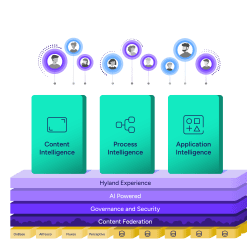What is machine learning (ML)?
Machine learning enables computers to learn from data and improve their performance over time. How can your team leverage this to get more from your data and improve decision-making?

Harness the power of a unified content, process and application intelligence platform to unlock the value of enterprise content.
Learn more
Explore Hyland’s solutions by industry, department or the service you need.
Overview of solutionsIt's your unique digital evolution … but you don't have to face it alone. We understand the landscape of your industry and the unique needs of the people you serve.
 Overview of industries
Overview of industries
Countless teams and departments have transformed the way they work in accounting, HR, legal and more with Hyland solutions.
 Overview of departments
Overview of departments
We are committed to helping you maximize your technology investment so you can best serve your customers.
 Overview of services
Overview of services

Discover why Hyland is trusted by thousands of organizations worldwide.
Hear from our customers
Our exclusive partner programs combine our strengths with yours to create better experiences through content services.
Overview of partners
Find resources to power your organization's digital transformation.
Browse the resource center
Hyland connects your content and systems so you can forge stronger connections with the people who matter most.
Learn about HylandWith our modern, open and cloud-native platforms, you can build strong connections and keep evolving.
 Dig deeper
Dig deeper
Reading time minutes
Machine learning enables computers to learn from data and improve their performance over time. How can your team leverage this to get more from your data and improve decision-making?

Machine learning is defined as the process of using data algorithms to help a computer learn without direct input. It is a subfield of artificial intelligence (AI) that gives computers the ability to learn and reason the way a human brain would, and automatically learn and improve from the data it is fed.
Machine learning uses algorithms and statistics to make classifications or predictions, leading to key insights that drive decision making.
Machine learning is embedded in an array of business applications and software. It is commonly used in search engines, emails for spam filters, banking software for fraud detection, chatbots and apps in the form of speech recognition and predictive text. It can also be used for security purposes like analyzing email communications or internet usage. Organizations can benefit from machine learning as well with process automation — freeing up time and resources.
Machine learning gives organizations insight into customer trends and operational patterns, and supports the development of new products. The adaptability of machine learning makes it a great choice in scenarios where data is constantly evolving, client requests are always shifting and coding could be complicated.
Related articles
Machine learning is more dependent on human input to determine the features of structured data. It is an application of artificial intelligence that includes algorithms that analyze and study data, and then apply what it has learned to make informed decisions.
As the artificial intelligence consumes data over time, its capabilities are greatly enhanced and refined.
In deep learning, the artificial intelligence structures algorithms in logical layers.
This “artificial neural network” is capable of learning and making informed decisions on its own. It automates the feature extraction piece of the process, eliminating the need for human intervention and enabling the use of larger data sets. It can analyze raw data, like unstructured documents and images, and determine what distinguishes it from another category of data.
Machine learning and deep learning are interchangeable, as they are all sub-fields of AI, but deep learning is a sub-field of machine learning. The way each algorithm learns is what differentiates machine learning and deep learning. Machine learning requires human intervention to get better, while a deep learning model can improve based on its neural network.
Diving deeper, here are two main types of machine learning and how they differ from each other:

Hear from industry experts from Hyland and Deep Analysis as they cover key findings from the recent Deep Analysis: Market Momentum Index report. Learn the current trends, actionable strategies and best practices to overcome challenges like data quality and process optimization.
Organizations that actively use machine learning have reaped many benefits — with even more possibilities for applications and systems to integrate machine learning as time goes on. Here are some key benefits: